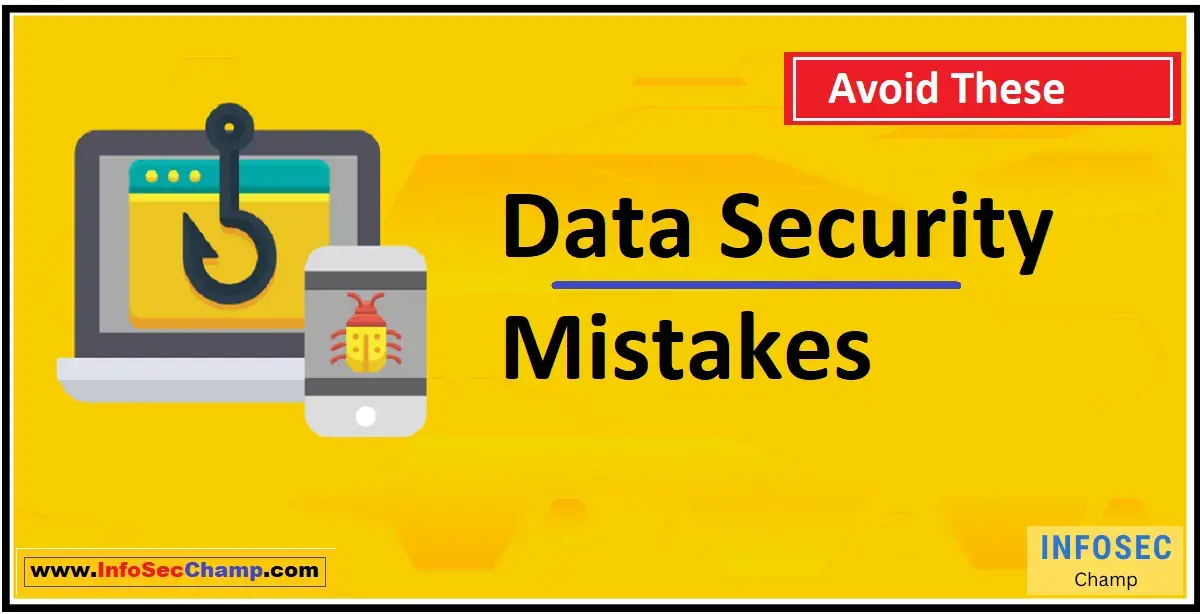Protecting sensitive information is now more crucial than ever for both individuals and businesses in the digital era. Unfortunately, several individuals and businesses make simple data security mistakes that expose their data to cyberattacks, data breaches, and other types of privacy abuses.
A lack of employee training is one of the most frequent data security mistakes. Without the appropriate training, employees may unintentionally expose the company’s data to risks since they are frequently the weakest link in a company’s security system. Data might also be subject to assaults due to inadequate security measures, such as old software or weak passwords.
Not encrypting saved data is a further typical error. Although encryption is a crucial tool for safeguarding sensitive data, many businesses either apply it incorrectly or not at all. Access by unauthorized parties and a failure to update security software are two additional frequent problems that might expose data to assault. It is crucial to take proactive measures to secure your data and train your staff on best practices if you want to avoid making these frequent data security mistakes.
Lack of Employee Training
Lack of employee training is one of the most frequent data security mistakes that businesses make. Without the appropriate training, employees may unintentionally expose the company’s data to risks since they are frequently the weakest link in a company’s security system.
Data security training for employees should cover subjects including password management, data encryption, and phishing scams. The value of updating software should also be covered in training, as doing so can prevent vulnerabilities from being exploited. Organizations must make sure that their staff members are informed on best practices for data security in order to reduce the chance of a data breach.
Inadequate Security Measures
Data can be vulnerable to attack due to inadequate security measures such as obsolete software, weak passwords, and insecure wireless networks. Strong security measures must be in place for organizations to protect their data. Employees should be subject to password regulations that mandate the use of strong passwords and frequent changes.
A secure password and robust encryption should be used to protect all wireless networks. It’s also crucial to keep software updated with the most recent security patches to guard against flaws that hackers might try to exploit.
Unencrypted Data Storage
Encryption is one of the most important measures of data security. All sensitive information kept on servers, hard drives, or mobile devices should be encrypted to prevent unauthorized access. Even in the event that a device is lost or compromised, encryption can stop unauthorized access to data.
Data that is not encrypted runs the danger of being accessed and used inappropriately by third parties. Strong encryption methods must be in place, and encryption procedures should regularly be audited to make sure that all sensitive data is correctly encrypted.
Third-Party Access
Although third-party access is frequently a vital component of conducting business, it can also pose a serious threat to data security. To ensure that only parties with permission can access sensitive information, third-party access should be strictly restricted and monitored.
To guarantee that third-party vendors adhere to proper data security standards, contracts should be put in place. To add an additional degree of protection, organizations ought to use multi-factor authentication for access from third parties.
Failure to Update Security Software
Vulnerabilities exposed by out-of-date security software can be exploited by hackers. For vulnerabilities to be swiftly patched, security software has to get regular updates. This holds true for firewalls, intrusion detection systems, and other security software in addition to antivirus software. To reduce the danger of a data breach, it is crucial to maintain all security software up to date with the most recent security patches.
Conclusion:
In the current digital era, data security is crucial. Sensitive information must be safeguarded against cyberattacks, data breaches, and other privacy violations by both organizations and people. Data can be kept safe and secure by avoiding typical data security mistakes including the absence of employee training, insufficient security measures, unencrypted data storage, third-party access, and the failure to update security software.

FAQs:
What are some common data security mistakes?
A: Poor security measures, storing data without encryption, allowing third parties access, and failing to update security software are all examples of common data security mistakes.
Why is employee training important for data security?, data security mistakes
Employee education is crucial for data security because, as the weakest link in a firm’s security chain, employees may unintentionally expose company data to risks if they lack the required training.
What is encryption, and why is it important for data security?
A decryption key is required in order to decrypt sensitive data, which is how sensitive information is transformed into an unreadable format. Because it prevents unauthorized access to data, encryption is crucial for data security and ought to be utilized for any sensitive data kept on servers, hard drives, or mobile devices.
Golden Quote:
“Data security isn’t just about protecting data. It’s about protecting people.” – Steve LaFredo

